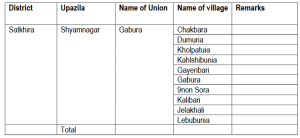- Project Title: Early recovery & Rehabilitation for the Cyclone Aila Affected Communities
- Reporting partner: PROGOTI, Nakipur, Shaymanagar, Satkhira.
- Reporting period: 16 August to 30 August ’09
- Location: Shyamnagar of Satkhira
- Target beneficiary: 5,000 HH
- Supported By: Oxfam GB.
- Funded by: ECHO
- Selected Working Aria:
Project select ten villages in Gabura unions of Shyamnagar upazila under Satkhira district to implement ECHO funded project. These villages are the extremely effected and destroyed by the cyclone Aila. The names of villages are stated bellow:

Project Objectives:
- Ensure livelihood options for the affected people.
- Ensure Safe water and Sanitation facilities for the distressed people
- Repairing the communication facilities and safe water sources instead of ensuring basic needs (through cash).
- Creating disaster and sanitation awareness among the costal people


Implementation Strategies
Step 01: A Project Implementation Committee (PIC) formed for every working village. This PIC is the main responsible for implementation. This PIC consist of nine members including local natural leader, local elected person, local teacher, poor people especially women etc.
.
Step 02: PIC get together in every month to review the implementation procedures, progress, and achievement, of project diversion. Project facilitates the get together and helps the PICs for smooth execution of the project.
Step 03: Project conducts feasibility analysis and conveys the final selection of intervention (CFW, Livelihood support, latrine installation, NFI distribution etc.) to the PIC with proper rationality.
Step 04: The implementation (CFW, NFI distribution, payment Etc.) will be started with the direct supervision of PIC.
Step 05: For the sustainability, Project handover all the responsibility to PIC after a detail orientation on keeping sustainability all interventions.
Achievements:
- We installed 84 (Including 04 plastic super structure latrine from Oxfam GB) low coast sanitary latrine in our working area with in last bi-week and as of till date we complete installation of 107 latrines out of 375.
- We select 3600 beneficiaries for CFW and select 22 schemes for CFW by assistance of PIC.
- We select 75 beneficiaries for Boat-Net, 125 beneficiaries of Tools for restore profession by the assistance of Project Implementation Committee.
- Trained staff disseminates the hygiene promotion massage among the beneficiaries family and they practice it in their personal life accordingly to reduce and prevent water born diseases in project area.
- Upazila DPHE officials and local representatives were actively suggesting us in all selection and implementation process.
- Project management staff attended District and Upazila level WATSAN coordination meetings regularly and play positive role.
Activities Work well:
- Beneficiaries’ selection through newly development formats whish is help full to identify real needy families affected by Aila
- Staff is fully involved for project activities accomplishment with full dedication and hardworking habits.
- Provide financial supports as per project needs.
- Latrine distribution going on as per revised plan.
- Beneficiaries selection for shelter materials distribution with through checking.
Activities Work not Well:
- Set project plans are not been implement due to bad weather, difficult communication and adverse situation of the selected villages (water still cover trough out the villages).
- Suppliers could not supply Shelter materials as per project require dates.
- Delayed selection of contractors / vendors for hard ware interventions especially latrine.
- Frequently change of schedule and plans.
Challenges
- Operation Villages are covered under saline water as embankment yet to repair as a result hardware interventions and other livelihood potion like cash for work, seed distribution et. Of the project is difficult to implement.
- All communication road and embankment has been broken by the cyclone so movement in the field is very difficult for the staff and other project related person. Boat is the only means of communication.
- During low tide staff has to wait for high tide because in working villages boat could not move during off tide.
- Heavy rainfall adversely affecting the field movement of the staffs and it is very difficult to organize the people in this adverse communication and environmental condition.
- Water born diseases have been broken out in the project area.
- Avoid duplication especially shelter materials distribution.
Learning
- Survey format of Beneficiary selection to be ensured in beginning of project period.
- For emergency project, skill and experience staff to be recruited.
- NFI and plastice sheet to be reached in advance at Godown.
- Recruitment of local for reducing staff drops out.
- For emergency project implementation, a straight line management structure (organogram) should be introduced.
- Avoid duplication (especially not to be considered those who received Plastic sheet and other housing materials earlier).
Next Bi-Weekly (31 August to 15 September, 2009) plan of Activities:
- Distribute Plastic Sheet, 4 pieces bamboo and rope for household level rainwater harvesting kit and emergency shelter kit among the 468 beneficiaries.
- We arrange for 3600 beneficiaries 07 days Cash for work with in next Bi-Week.
- 3 Nos De-Watering Drinking Water Ponds
- Distribute 268 Nos of hygienic latrine with privacy super structure at shelter, embankment and community place of project area.
- 45 Nos of existing Hand Tube Well raising/renovating/repairing with platform.
- Community orientation on hygiene promotion.
- Attend District, Upazila and Union WATSAN coordination meeting.
- Continue Monitoring and documentation.
Conclusion
Gabura is the extreme affected area of cyclone AILA 2009. People have sacrificed their all belongings and take shelter on embankment. They are in very inhuman condition. Their sufferings reached to the extreme level due to scarcity of safe water for drinking and other household purpose, livelihood and scarcity of sanitation facilities. Project worked to minimize the sufferings of AILA affected people and trying to manage sustainable safe water sources, sanitation facilities and livelihood opportunity by the assistance ECHO Project.
